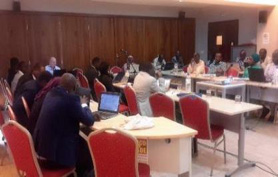Empowering an Agricultural Policy Research System: The Case of the Network of Local Centers ....
Creation of the Local Analysis Network that regroups Senegal’s centers of expertise to support evidence-based policy making.
By Kimsey Savadogo

Senegal has several excellent agricultural research institutions to inform and support policy. But these institutions have worked in isolation for decades, with little coordination and collaborations. The Feed the Future Senegal Agriculture Policy Project (PAPA) has transformed the way research to inform policy is done by creating the Local Analysis Network that regroups Senegal’s centers of expertise. This is the first analysis network in the sub region and, as defined in the Regional Strategic Analysis and Knowledge Support System (ReSAKSS), it is a new tool and concept central to support evidence-based policy making.
Photo: Local analysis network meeting, January 2016
Mouhamed Rassoul Sy, a junior researcher from the Bureau for Macroeconomic Analysis of the Senegalese Institute of Agricultural Research (ISRA/ BAME) explains: “The network is effective in structuring agricultural policy research in Senegal. It brings people who used to work in isolation together, and it is also a good channel for researchers to learn more from each other through interactions with partners from international research institutions and universities. For example, the network has been crucial in sharpening our skills in survey design, data collection, and statistical analysis, and in formulating better the research questions that need to be addressed to serve policy.”
The Local Analysis Network is a very flexible structure that brings together researchers from several centers and university departments to undertake analytical work relevant to applied policymaking. Research scientists from ISRA/BAME, the Division of Analysis, Forecasting and Agricultural Statistics (DAPSA) within the Ministry of Agriculture, the Consortium for Economic and Social Research (CRES), and the Department of Economics of Cheikh Anta Diop University of Dakar (FASEG /UCAD) are current active members of the Network.
Amy Faye, a doctoral student at Cheikh Anta Diop University, explains the cross-disciplinary advantages of the network: “The PAPA network gathers all the institutions working on agricultural issues in Senegal. In this framework, the network brings together not only multiple institutions but also multiple researchers (from the institutions) with different skills, experience, and expertise. This has constituted an opportunity for junior researchers like me to benefit from them in multiple ways. First, it has contributed to the reinforcement of our competences and research capacity through valuable interactions and advices. Second, interacting with people from diverse backgrounds and from institutions with different ways of working has exposed us to an array of economics research methods and techniques.”
Indeed, prior to the advent of the Local Analysis Network, research to inform policy in the agriculture sector would come in a piecemeal fashion, from isolated consulting firms or research centers. With the network, a holistic approach has been taken to generate comprehensive micro level data at all the stages of the value chains of the most important agricultural commodities and inputs. Such a feat is simply not imaginable under the traditional reliance on outside researchers or by tapping on only one national research institution or consulting firm.
Since its creation about two years ago, the Local Analysis Network has collected data from urban and rural consumers, inputs dealers, dry cereals, horticulture, and irrigated rice producers. By exploiting several tools, including an inclusive dialogue platform that was strengthened under PAPA, and the development of a knowledge management platform, the Local Analysis Network is now able to deliver good quality data analysis, validated and made available to end-users through the web-based knowledge management platform. The research supported by this knowledge platform will affect the lives of millions of farmers for whom good policy making is key to survival and prosperity.
As Amy Faye concludes, “Within the PAPA network, the interactions during the data collection phase have yielded promising results, and I am confident that the remaining part of the work will be as successful as what we have achieved to date. Indeed, the data analysis process will give me the opportunity to co-author publications with senior researchers. We will all learn from their expertise while doing great research together that will end up being valuable to the country policy making process.”



 Print
Print Email
Email




